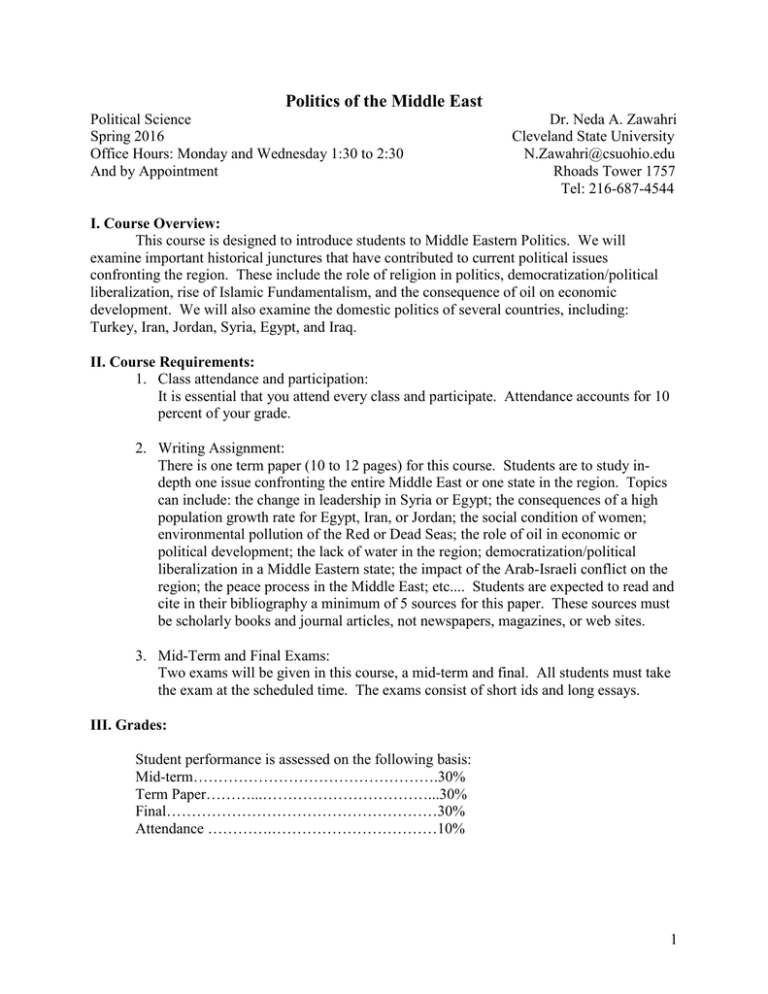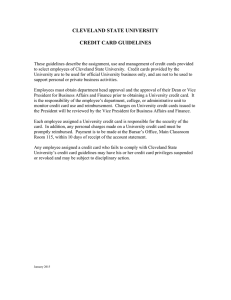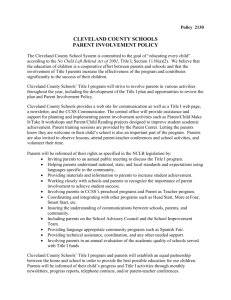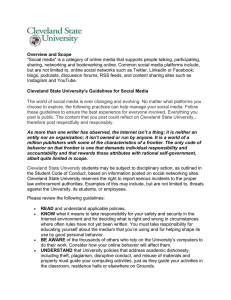Politics of the Middle East
advertisement

Politics of the Middle East Political Science Spring 2016 Office Hours: Monday and Wednesday 1:30 to 2:30 And by Appointment Dr. Neda A. Zawahri Cleveland State University N.Zawahri@csuohio.edu Rhoads Tower 1757 Tel: 216-687-4544 I. Course Overview: This course is designed to introduce students to Middle Eastern Politics. We will examine important historical junctures that have contributed to current political issues confronting the region. These include the role of religion in politics, democratization/political liberalization, rise of Islamic Fundamentalism, and the consequence of oil on economic development. We will also examine the domestic politics of several countries, including: Turkey, Iran, Jordan, Syria, Egypt, and Iraq. II. Course Requirements: 1. Class attendance and participation: It is essential that you attend every class and participate. Attendance accounts for 10 percent of your grade. 2. Writing Assignment: There is one term paper (10 to 12 pages) for this course. Students are to study indepth one issue confronting the entire Middle East or one state in the region. Topics can include: the change in leadership in Syria or Egypt; the consequences of a high population growth rate for Egypt, Iran, or Jordan; the social condition of women; environmental pollution of the Red or Dead Seas; the role of oil in economic or political development; the lack of water in the region; democratization/political liberalization in a Middle Eastern state; the impact of the Arab-Israeli conflict on the region; the peace process in the Middle East; etc.... Students are expected to read and cite in their bibliography a minimum of 5 sources for this paper. These sources must be scholarly books and journal articles, not newspapers, magazines, or web sites. 3. Mid-Term and Final Exams: Two exams will be given in this course, a mid-term and final. All students must take the exam at the scheduled time. The exams consist of short ids and long essays. III. Grades: Student performance is assessed on the following basis: Mid-term………………………………………….30% Term Paper………...……………………………...30% Final………………………………………………30% Attendance ………….……………………………10% 1 Grading Scale 95-100 90-94 87-89 83-86 80-82 A AB+ B B- 77-79 73-76 70-72 69-60 Below 60 C+ C CD F IV. Course Material: William L. Cleveland, A History of the Modern Middle East (Westview Press 2013). Electronic Course Reserve available online password is 7661. V. Rules and Regulations: 1) All wireless devices (cell phones and computers) must to be turned off during class. 2) No guests (this includes children) are allowed to attend class without prior permission from the professor. No guests will be allowed to attend more than one class. Guests that are disrupting class will be asked to leave along with their host. 3) Examination Procedure: Once an examination has started the student MAY NOT leave the examination room until the examination is completed. If a student leaves the room, the examination, for that student, is over. Also, no talking until everyone has completed and turned in the exam. 4) Early Examinations: No early examinations will be given. 5) Make up exams: Available only under special circumstances and student must contact professor within 48 hours of the exam date to arrange a make up exam. 6) Late Assignments: Assignments turned in after their due date will be reduced one grade per late course day. Emailed assignments will not be accepted. 7) Excuses: If there is a death in the family, a major illness, or a religious holiday, which necessitates an extension for your assignment, it must be documented. The proper documentation includes a dated obituary, a letter from your doctor, and/or a letter from your religious leader (I will call the doctor to confirm the information and this doctor cannot be your parent/relative). 8) Academic Misconduct: Cheating and plagiarism will not be tolerated. If caught, the Policy on Academic Misconduct (3.2.1) of the University’s Code of Student Conduct will be followed. This course will have an account with a plagiarism service provider (www.turnitin.com), which is capable of identifying the originality of any assignment. 9) During this course we will discuss controversial and emotional issues. This requires laying down ground rules for this course: students do not speak unless called upon; only one person can speak at any given moment; students will respect one another in this course—meaning there will be no talking back to your classmates; and we will respect each other’s opinion. 2 VI. Course Outline January 20 Introduction to Class January 22 and 25 The Ottoman Empire Cleveland pages 34 to 47 January 27 and 29 The Rise of Turkey Cleveland Pages 162-171 February 1, 3, and 5 Modern day Turkey Cleveland Pages 255-267 February 8, 10, and 12 Challenges Confronting Turkey Marvine Howe, Turkey Today Chapters 1, 2, 7, & 12 February 15, Presidents’ Day No Classes! February 17, 19, and 22 Rise of Iran Cleveland pages 171-178 Cleveland pages 267-279 ***Paper Topics Due February 17 (One page description of the topic.) February 24 and 26 The Iranian Revolution Cleveland Chapter 18 February 29 and March 2 and 4 Theocracy in Iran Ervand Abrahmian, Iran Between Two Revolutions (Princeton: Princeton University Press, 1982) Chapter 11. 3 March 7 and 9 Challenges Confronting Iran & Review for the Midterm Azadeh Kian-Thiebaut, “Political and Social Transformations in PostIslamist Iran,” Middle East Report, (Autumn, 1999). Review for Midterm Exam March 11 Midterm Exam March 14 to March 18 Spring Break March 21, 23, and 25 The Middle East and Imperial Powers Cleveland Chapters 11 and 12 March 28 and 30 Rise of Independent Egypt Cleveland Chapter 15 April 1, 4, and 6 The Egyptian Government Cleveland Chapter 16 April 8, 11 and 13 Challenges Confronting Egypt (Arab Spring and Beyond) Cleveland pages 369-379 Cleveland Chapter 26 Term Papers Due Beginning of Class April 11th. April 15, 18, and 20 Rise, stabilization, and governance of the Hashemite Kingdom Don Peretz, The Middle East Today, chapter 12, “The Hashemite Kingdom of Jordan.” Beverley Milton-Edwards and Peter Hinchcliffe, “Abdullah’s Jordan: New King, Old Problems,” Middle East Report, (Winter, 1999). 4 April 22 and 25 Challenges Confronting Jordan (Arab Spring) Lamis Andoni, “King Abdallah: In His Father’s Footsteps?” Journal of Palestine Studies, (Spring, 2000). April 27 and 29 May 2 and 4 Stabilizing Independent Syria (The Arab Spring and The Civil War) Don Peretz, The Middle East Today, chapter 14, The Republic of Syria. Bassam Haddad, “Change and Stasis in Syria: One Step Forward…,” Middle East Report, (Winter, 1999). May 6 Review for the Final Final Exam Friday May 13 12:30 to 2:30 5




